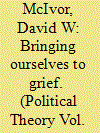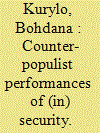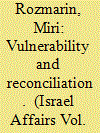| Srl | Item |
| 1 |
ID:
113881


|
|
|
|
|
| Publication |
2012.
|
| Summary/Abstract |
Within political theory there has been a recent surge of interest in the themes of loss, grief, and mourning. In this paper I address questions about the politics of mourning through a critical engagement of the work of Judith Butler. I argue that Butler's work remains tethered to an account of melancholic subjectivity derived from her early reading of Freud. These investments in melancholia compromise Butler's recent ethico-political interventions by obscuring the ambivalence of political engagements and the possibilities of achieving and sustaining non-dogmatic identities. To overcome this impasse I argue for an alternative framing of mourning by turning to the psychoanalytic theory of Melanie Klein. An account of mourning that leans upon Klein's work cashes in on the ethical and political promises that are immanent yet unrealized in Butler's recent work while providing a new orientation for mourning in, and for, democratic politics.
|
|
|
|
|
|
|
|
|
|
|
|
|
|
|
|
| 2 |
ID:
183711


|
|
|
|
|
| Summary/Abstract |
IR scholarship has recently seen a burgeoning interest in the right-wing populist politics of security, showing that it tends to align with the international ultraconservative mobilisation against ‘gender ideology’. In contrast, this article investigates how local feminist actors can resist right-wing populist constructions of (in)security by introducing counter-populist discourses and aesthetics of security. I analyse the case of Poland, which presents two competing populist performances of (in)security: the Independence March organised by right-wing groups on Poland's Independence Day and the Women's Strike protests against the near-total ban on abortion. The article draws on Judith Butler's theory of the performative politics of public assembly, which elucidates how the political subject of ‘the people’ can emerge as bodies come together to make security demands through both verbal and non-verbal acts. I argue that the feminist movement used the vehicle of populist performance to subvert the exclusionary constructions of (in)security by right-wing populists. In the process, it introduced a different conception of security in the struggle for a ‘livable life’. The study expands the understanding of the relationship between populism, security and feminism in IR by exploring how the populist politics of security is differently enacted by everyday agents in local contexts.
|
|
|
|
|
|
|
|
|
|
|
|
|
|
|
|
| 3 |
ID:
153236


|
|
|
|
|
| Summary/Abstract |
This article argues that mapping vulnerabilities of both sides in conflicts is essential for building sustainable processes of transformation aimed towards reconciliation. This mapping should be attentive to two kinds of vulnerability – contextual and ontological; the former designates social wrongs, and the latter stands for a basic aspect of human lives. The first part of the article discusses the difference between ontological and contextual vulnerability. The second part addresses the question of how acknowledging vulnerability may influence politics. The third part elaborates on how addressing vulnerability might operate as part of reconciliation processes. The final part argues that the Minds of Peace (MOPE) Experiment, as a simulation of a Palestinian‒Israeli public peacemaking assembly, should include special attention to vulnerability. It then suggests some practical measures that could be integrated into the MOPE experiment in order to engage with the aspect of vulnerability.
|
|
|
|
|
|
|
|
|
|
|
|
|
|
|
|